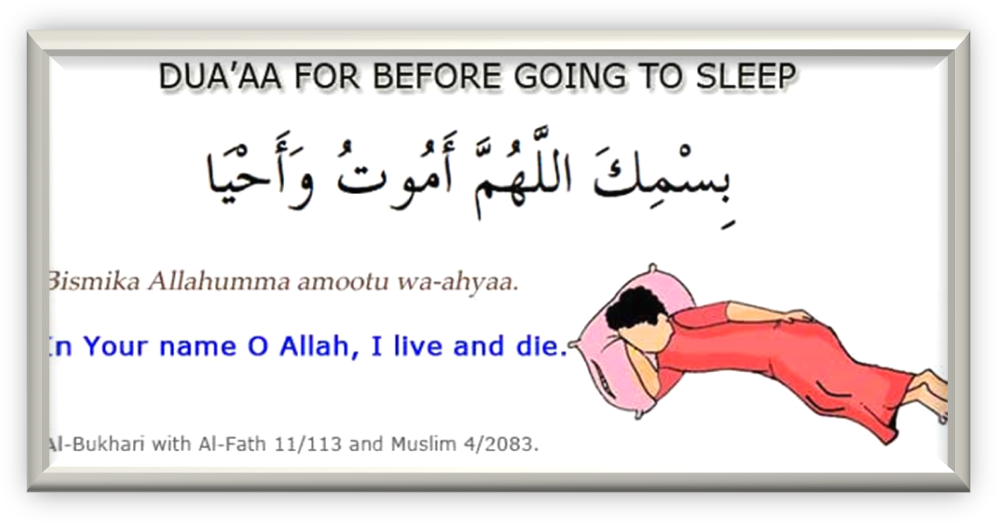- “بِسْمِكَ اللَّهُمَّ أَمُوتُ وَأَحْيَا”
- “Bismika Allahumma amootu wa ahyaa”
- Translation: “In Your name, O Allah, I die and I live.”
The dua “بِسْمِكَ اللَّهُمَّ أَمُوتُ وَأَحْيَا” (“Bismika Allahumma amootu wa ahyaa”) translates to “In Your name, O Allah, I die and I live.” It is derived from the practice of the Prophet Muhammad (PBUH) to remember Allah before sleeping, as mentioned in various hadiths. This dua signifies acknowledging Allah’s control over life and death, reinforcing trust in His power and mercy. By reciting it before sleep, one expresses reliance on Allah for a peaceful transition into sleep and a hopeful awakening. The hadith source for this dua is found in Sahih al-Bukhari (6313) and Sahih Muslim (2712), reflecting the Prophet’s (PBUH) routine of making supplications before resting.
Background and Context
The dua “بِسْمِكَ اللَّهُمَّ أَمُوتُ وَأَحْيَا” (“Bismika Allahumma amootu wa ahyaa”) translates to “In Your name, O Allah, I die and I live.” This supplication is a practice of the Prophet Muhammad (PBUH) to remember Allah at the end of the day, specifically before going to sleep. It is rooted in the Prophet’s (PBUH) routine of engaging in supplications and reflecting on Allah’s dominion over all aspects of existence.
Significance of the Dua
- Acknowledgment of Allah’s Control:
- By reciting this dua, a person acknowledges that Allah is the ultimate controller of life and death. This reflection fosters a sense of trust and reliance on Allah’s will, preparing the believer to face both life and death with faith and submission.
- Preparation for Sleep:
- Sleep is metaphorically akin to a form of death, as one loses consciousness and is in a state of vulnerability. This dua seeks Allah’s protection and mercy during this time, entrusting oneself to Allah’s care while unconscious.
- Expression of Trust and Faith:
- The supplication is an expression of faith in Allah’s power and mercy. It reflects a deep-seated trust that Allah will protect and care for the believer during sleep and ensure a safe awakening.
Hadith Source
The dua is derived from authentic hadith literature. The most notable sources include:
- Sahih al-Bukhari: The dua is mentioned in Sahih al-Bukhari (Hadith 6313), where it is recorded as part of the Prophet Muhammad’s (PBUH) nightly routine before sleeping.
- Sahih Muslim: It is also found in Sahih Muslim (Hadith 2712), emphasizing its importance and practice among early Muslims.
These hadiths underscore the significance of this supplication as part of the Prophet’s (PBUH) practices, providing a model for Muslims to follow in their nightly routine.


Leave A Comment